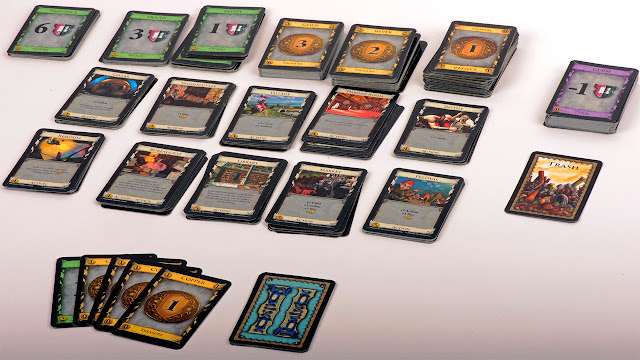In January 2016, KaCSFFS member and
notable board game collector David Means gave a presentation
to the club about his collection. It was so interesting, I asked for permission
to reprint it as a series of posts on this blog. He graciously agreed, and supplied
me with his script. I have added the illustrations, hyperlinks, embedded
videos, etc. We hope you enjoy! --Jan S. Gephardt
Not Your Parents' Board Games
Part Two
By David Means
At this point I should
define some of the jargon terms that board gamers use:
 |
| Mechanics: deck-building game play. |
 |
| More mechanics: dice of various types. |
Theme
-- The subject matter of the game. Board gamers argue over whether a game’s
theme is integrated with the mechanic, or whether it is just “pasted on.”
Base Game and Expansion -- Sometimes game companies will produce
expansions for successful games. These usually add more variety and additional
game play.
If there are expansions
for a game you own, but you play the game without them, you are said to be
playing the ‘base’ or ‘basic’ game. When board gamers add expansions to their
base game, they usually specify which expansions (if there are multiple ones)
they play with so that everyone understands what they are talking about.
Variant
-- Different versions of the same game; the mechanics are usually the same, but
the theme is often different. Examples: the Lord
of the Rings version of Risk, the umpteen varieties of Trivial Pursuit, Operation, and Monopoly.
 |
| Here's a look at a classic Risk! setup from 1968. |
 |
| And then there's Lord of the Rings Risk (and many others). |
 |
| Just a small sample of the Monopoly variants listed on Wikia. |
Pimping
-- Fan-made enhancements, either major or minor, to improve the looks and
playability of the game.
 |
| Polymer clay modifications to the Robinson Crusoe game: this hobbyist goes all out! |
Fiddly
-- This complaint about a game means that there are a lot of components which need to be moved or adjusted frequently during play. However, ‘fiddly’ is in the eye of the beholder -- some players think a pair of dice and a pawn are plenty to handle, while others don’t mind having seventeen different cards and markers to keep track of.
 |
| One blogger wrote a post about how fiddly The Alchemists is. |
 |
| Meeples |
Meeple
-- A marker used in the game Carcassonne to indicate which player has claimed a
city, road, or field. The markers are humanoid and the name might have come
from the term “my people” or possibly from “mini-people”.
Now the term has
become more general used, and some gamers alter it to refer to the markers they
are talking about; i.e. vegetable-shaped markers become “vegi-eeples” or
“vegeeples”, cow-shaped markers are “cow-eeples”, and so forth. Editor’s note: I found a humorous, illustrated “backlash”
post, “Cowples are not Meeples,” that you might also enjoy.
 |
| Meeples (as well as a "cowple," a "sheeple," and a "pig-ple?") for the Agricola game. |
American-style games typically eliminate players until only the winner is left. European or ‘Euro-style’ games generally keep all the players in the game until some pre-determined ending is reached -- a certain number of turns, a card stack is all gone, some resource marker is used up, etc. -- and then victory points are totaled to determine the winner.
IMAGES: Many thanks to Tested for the image
illustrating deck-building mechanics, to PhilBoxing Forum for the image of the
steel dice, YouTube and “airfats1” for the video of the World of Warcraft setup
with expansions, to BoardGame Geek for the photo of the Classic Risk! of 1968, and BoardGame Geek again, for the Lord of the Rings Risk;
to Wikia for allowing a screen grab of 15 Monopoly variants or listings; to The
Cult of the Game for a photo of some of the author’s seemingly endless polymer
clay creations to pimp the Robinson Crusoe game; to The Session Report on The
Alchemists, for an example of a “fiddly” game; to Whoseturnisitanyway? For the
meeples image (see also the essay “Cowples are not Meeples”); and to Dapper Devil for the photo of the Agricola meeples.
No comments:
Post a Comment